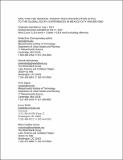Applying the General Transit Feed Specification to the Global South
Author(s)
Eros, Emily; Mehndiratta, Shomik; Webb, Kevin; Ochoa, Maria; Zegras, P. Christopher
DownloadZegras_Applying the.pdf (456.3Kb)
OPEN_ACCESS_POLICY
Open Access Policy
Creative Commons Attribution-Noncommercial-Share Alike
Terms of use
Metadata
Show full item recordAbstract
A combination of open data tools and methods, facilitated by data format standardization, has started changing business as usual in the transit industry. The general transit feed specification (GTFS) has become the de facto standard for releasing public transit route and schedule data. This study analyzed this rapidly evolving transit information sector through the Mexico City, Mexico, experience. The case study illustrated that even a megacity with several transit providers could create a fully functional GTFS feed in a few weeks and obtain the benefits of work done elsewhere. Because of the global open data ecosystem, a range of free or low-cost applications—customer-facing applications and planning tools—can immediately capitalize on these data. However, the Mexico experience revealed a limitation of GTFS in its current form: its inability to easily accommodate semi-structured public transit services common in many cities in the developing world. An adaption to GTFS developed in Mexico City to address this limitation is described. The case study revealed significant untapped potential to maximize the value of the open data ecosystem, particularly for planning and regulatory tools.
Date issued
2014-12Department
Massachusetts Institute of Technology. Department of Urban Studies and PlanningJournal
Transportation Research Record: Journal of the Transportation Research Board
Publisher
Transportation Research Board of the National Academies
Citation
Eros, Emily, Shomik Mehndiratta, Chris Zegras, Kevin Webb, and Maria Ochoa. “Applying the General Transit Feed Specification to the Global South.” Transportation Research Record: Journal of the Transportation Research Board 2442 (December 2014): 44–52.
Version: Original manuscript
ISSN
0361-1981